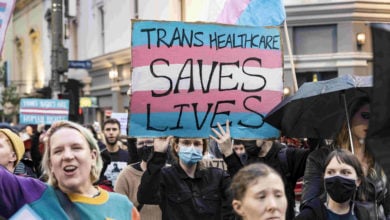Prof. Zachary Wolfe teaches “Law As a Force for Social Change” and “Progressive Movements: Rewriting History” at George Washington University, coordinates National Lawyers Guild legal observers and chairs the Amicus Curiae Committee of the NLG, and is the author of Hate Crimes Law and the First Amendment chapter in “Sexual Orientation and the Law.”
When people learned of the California Supreme Court’s decision upholding Proposition 8 (in the combined cases of Strauss v. Horton, Tyler v. State of California, and City and County of San Francisco v. Horton) on May 26, 2009, many followed a natural need to look for some sort of silver lining. Liberal blogs sought to convince us that the decision was better than it appeared. But a proper understanding of the case, the intellectual approach it employs, and these factors’ relationship to contemporary “liberal” judicial philosophy and liberalism in general reveals how loaded terms like “pragmatism” and “respect for the rule of law” (both of which we will be hearing a lot during the upcoming U.S. Supreme Court confirmation process) were used to ignore controlling legal principles that should have invalidated the initiative.
The strongest legal argument against the validity of Prop. 8 was (and remains) that democratic societies do not permit a tyranny of the majority. Whether we see it in practice or not, the asserted premise of any modern constitutional system with equality and due process provisions is that a majority of voters may not keep something for itself while denying it to a minority of the population. This was the essential grievance of the opponents of Prop. 8, and it was the principle that the Court, employing a liberal wash and pragmatic excuses, chose to ignore.
The California Supreme Court had an easy way to invalidate Prop. 8 on a straightforward legal basis. California’s constitution allows amendments, which are relatively limited changes to the constitution, to be presented directly and only to the voters, for majority vote. But it requires constitutional revisions, which work significant changes on the constitutional scheme, to first be approved by two-thirds of both legislative chambers before being presented to the voters. So the court could have invalidated Prop. 8 on the grounds that it revokes essential premises of equality and due process, thereby revising the constitutional scheme without following the required process.
The California Supreme Court also had a more creative path for invalidating Prop. 8 available to it, paved by California Attorney General Edmund G. “Jerry” Brown. Using principles of sovereignty and limited government (the “social contract” theory) accepted since the dawn of modernity, he argued that no government has the power to infringe upon an individual’s right to equal treatment. Since the initiative process and the constitution itself is a subset of the government, the attorney general argued that it, too, lacked the authority to infringe upon equality because equal treatment is a sovereign right the people never surrendered to the state.
Instead of taking these principles seriously and holding to their commands, the California Supreme Court took a liberal, pragmatic approach. This necessarily resulted not only in an injustice to the LGBT community, but a manipulative opinion that ignored fundamental values and even embraced “separate but equal.”
The majority decision begins by defensively reciting its obligation to follow only the written words of the constitution, being careful not to employ “values” or a sense of what is justice. However, true respect for the rule of law requires a robust appreciation for the values of equality and due process—the fundamental issues that the court chooses to ignore, perversely in the name of respect for law. In doing so, it mischaracterizes Jerry Brown’s argument, creating straw men and, by failing completely to engage the important questions, seems to assume that, in fact, California’s constitution does empower the voters in flawed, bourgeois elections to create a tyranny of the majority.
Perhaps most critically—and what probably won over the justices who were previously pro-equality—the decision appears to offer up a scrap for the LGBT community by interpreting Prop. 8’s reach very narrowly. This is a pyrrhic victory*. The court finds that Prop. 8 does not affect the “substantive” rights of same-sex couples, but “only the designation of marriage.” While giving lip service to the notion that designations matter, in substance the court finds that it’s just a word. Pragmatism itself.
The court had to give the terminology limited importance in order to justify its decision to uphold Prop. 8. If designations mattered, then creating a “separate but equal” system would be inconsistent with core principles of equality and due process, making Prop. 8 an invalid revision of the constitutional scheme. The sleight of hand maneuver it employs to hide this controlling factor is pragmatism: it’s just a word, without material consequences. The court ignores the fact that we’ve had this argument before. Separate systems are inherently unequal, and have no place in a democratic system. A “No Gays Allowed” sign at one window in the county clerk’s office is no less harmful if an office down the hall is offering the same forms. As the Massachusetts Supreme Judicial Court said, in its 2004 Advisory Opinion to the Senate clarifying that a civil union system would not be a legitimate response to its gay marriage decision, “The dissimilitude between the terms ‘civil marriage’ and ‘civil union’ is not innocuous; it is a considered choice of language that reflects a demonstrable assigning of same-sex, largely homosexual, couples to second-class status.”
Finally, the court upholds the validity of same-sex marriages performed in California before Prop. 8’s passage. Again, this liberal and pragmatic turn allows the court to skirt the real questions of principle that, if squarely and honestly confronted, would have required it to invalidate Prop. 8. This is plain from its rather poor attempt to deal with the language of the initiative followed by its surprisingly honest recognition “that a contrary resolution of the retroactivity issue would pose a serious potential conflict with the state constitutional due process clause.” Thus, the court tosses same-sex couples a second tiny “win” because this allows it to avoid recognizing just how inconsistent Prop. 8 is with basic democratic legal principles.
The Prop. 8 decision provides an encapsulated view of the violence of liberalism and pragmatism on the bench. Contemporary liberal jurists speak of “democratic constitutionalism,” in which judges engage in “dialogue” with the other branches and civil society to move issues along, but will not declare enforceable rights until there is majority support. Necessarily, this requires a false dialogue, valuing “pragmatism” as a means of avoiding the real principles at stake and people’s legitimate grievances, because to do otherwise would expose the hypocrisy of a system that is supposed to protect minority rights and fundamental values but instead can only hide from those issues—until, that is, the people’s movement has made it not only safe for scared liberal judges but mandatory for any system that wants to maintain its position.
Today’s judicial liberalism and pragmatism is the latest cloak for efforts to fight both real democracy and principled constitutionalism. As the U.S. Supreme Court nomination process consumes the media’s attention, we should bear in mind that Obama-style judicial liberalism and pragmatism finds clear example in the recent Prop. 8 decision.
* A victory that comes at an enormous cost.






